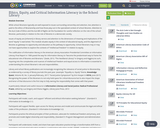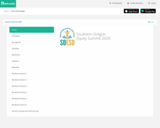
While school librarians typically are well exposed to issues surrounding censorship and selection, less attention is paid to the ethics of librarianship and how those play out in the specialized context of school libraries. Attention to the ALA Code of Ethics and the ALA Bill of Rights set the foundation for careful reflection on the role of the school librarian, particularly in relation to the role of libraries in a democratic society.Issues of equity are [inherent] in library service and attention to the dimensions of meaning and implications of the word “equity” is warranted. This module situates equity in the context of educational equity, and the alignment of libraries as gateways to opportunity and education as the pathway to opportunity. School librarians may or may not have opportunities to explore the contexts of “intellectual freedom” in relation to equity.The codification of information literacy in the American Library Association Presidential Committee on Information Literacy Final Report in 1989 paved the way for information literacy to “become the predominant way to frame the educational role of libraries and librarians.” (Seale, 2013, “The Neoliberal Library” in Gregory and Higgins) As such, inquiring into the complexities and nuances of intellectual freedom and equal access to information is essential to understanding the school librarian’s role and responsibilities.Library and school library publications are increasingly recognizing the relevance of social justice to librarianship, as evidenced by a survey of library journals this past year. (example: “Equality vs. Equity” theme, Knowledge Quest, Volume 45, No. 3, January/February, 2017; “Social Justice Symposium” by Erin Hooper in VOYA, June 2017) Recognizing the power of the librarians to not only hold space for critical discourse but to also impact the shape and tenor of that discourse is the first step to fully owning the responsibility that comes with that power.A particularly relevant and useful resource is Information Literacy and Social Justice: Radical Professional Praxis, edited by Lua Gregory and Shana Higgins, Library Juice Press, 2013Learning Objectives:Participants will model, coach, and support "efficient and ethical information-seeking behavior" (Standard 3: Information & Knowledge 3.1)Participants will support flexible, open access for library services and model and communicate the legal and ethical codes of the profession. (Standard 3: Information & Knowledge 3.2)Participants practice the ethical principles of their profession, advocate for intellectual freedom and privacy, and promote and model digital citizenship and responsibility. (Standard 5: Program Management and Administration 5.2)Participants will understand, model, and share how open education practice brings a transformative shift from a proprietary and industrial education model to a participatory education model. (ISKME: Leadership and Advocacy - Advancing Open Practice)
